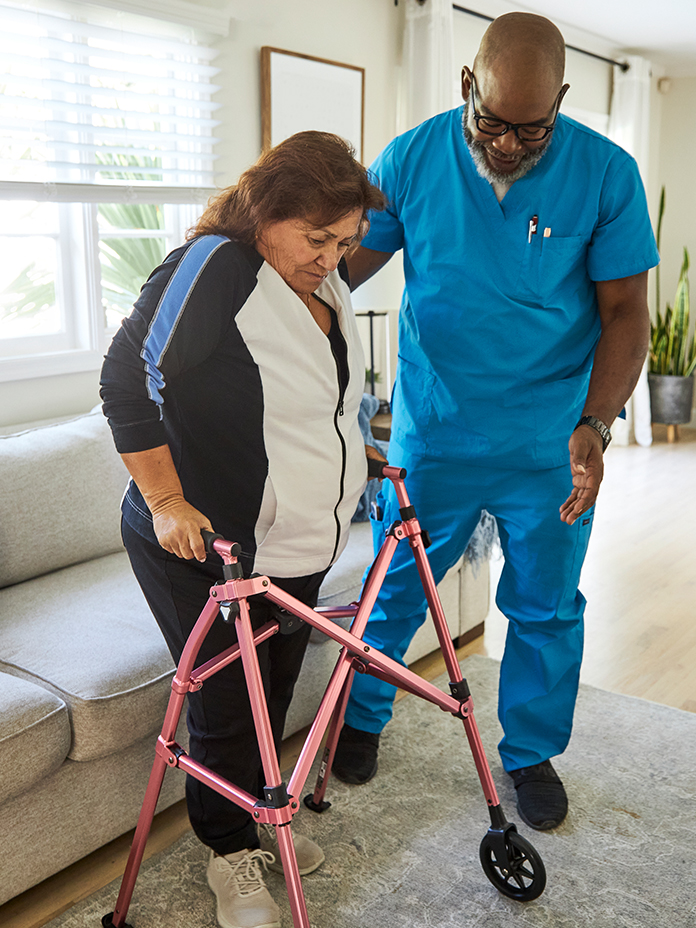Another group or vendor provides the info on the next page. If you don’t want to leave our site, choose the “X” in the upper right corner to close this message. Or choose “Go on to next website” to move forward.
More info
Questions? You can always check your provider manual (PDF) for behavioral health guidelines and other information you need.
If you’re treating a member in crisis, we can help you 24 hours a day, 7 days a week. Just call 1-855-232-3596 (TTY: 711). Members can also call directly.
Questions? You can always check your provider manual (PDF) for behavioral health guidelines and other information you need.
If you’re treating a member in crisis, we can help you 24 hours a day, 7 days a week. Just call 1-855-232-3596 (TTY: 711). Members can also call directly.
Whole health is the goal

Whole health is the goal
We help members and their families by making key connections between medical, mental and behavioral health, as well as disability, wellness and prevention. These are the connections that help members take steps toward whole health.
Behavioral health includes the emotions and behaviors that affect a person's overall well-being. Treatment and services are geared toward supporting members with mental health and/or substance use needs.
Behavioral health integration
We’re working closely with our providers to ensure smooth transitions related to the behavioral health integration that takes place for phase 1 on January 1, 2025. For an overview of these changes and impacts on providers, you can refer to these materials:
- Training presentation (PDF)
- Live trainings
- Provider Behavioral Health Integration FAQs (PDF)
- Provider manual (PDF)
Behavioral health coverage
Behavioral health coverage
Behavioral health benefits vary depending on which NJ FamilyCare plan the member is enrolled in. Coverage changes related to behavioral health integration will occur, and they will be effective on January 1, 2025.
For up-to-date information about coverage, check the covered service grid in your provider manual (PDF). To inquire about a specific member’s coverage, call us at 1-855-232-3596 (TTY: 711).
Members may still receive coverage under the Medicaid Fee-for-Service (FFS) program for some behavioral health services.
Providers can call the toll-free number located on the back of the member’s ID card to access:
Information about services
Participating behavioral health providers
Authorization information for members who request services from a behavioral health provider directly
For all members, we also cover the diagnoses of diseases of organic origin categorized as altering the mental status of a member.

Referrals
Member self-referrals
Covered members can self-refer to any mental health/substance use provider in our network without:
Prior authorization (PA)
A referral from their primary care provider (PCP)
PCP referrals
We promote early intervention and health screening to educate members and find behavioral health problems. To that end, we expect network providers to:
Screen, evaluate, treat and/or refer (as medically appropriate) any behavioral health problem or disorder
Treat mental health and/or substance use disorders within the scope of their practice
Tell members how and where to get behavioral health services
Prior authorization (PA)

Prior authorization (PA)
For our network providers, many behavioral health services require that the provider complete PA for the services.
Examples of services requiring PA include:
Intensive outpatient (IOP)
Partial care/hospitalization (PC, PHP, APH)
Residential, detoxification and inpatient services
For out of network providers, all treatment and services will require PA.
To find out whether a treatment or service needs PA, you can use ProPAT, our online prior authorization tool.
You can request PA from one of three ways:
Online: Ask for PA through our Provider Portal. Visit the Provider Portal
By fax: Download our PA request form (PDF). Then, fax it to us at 1-844-797-7601. Be sure to add any supporting materials for the review.
By phone: Ask for PA by calling us at 1-855-232-3596 (TTY: 711).
Treatment services for members with autism spectrum disorder
Treatment services for members with autism spectrum disorder
Members under age 21 with a diagnosis of autism spectrum disorder have access to applied behavioral analysis (ABA)/developmental, individual difference, relationship-based model (DIR) services.
To receive ABA or DIR services, the member’s provider must complete an assessment and create a proposed treatment plan. Then, you’ll want to submit a PA form:
Online: Submit your PA form through our Provider Portal. Visit the Provider Portal
By fax: 1-844-404-3972
By phone: 1-855-232-3596 (TTY: 711)
Providers can perform ABA services:
In their office
In a community setting
In the member’s home
Through telehealth services
Need to learn more? Just check the State Newsletter Volume 30, No. 06 and State Newsletter Volume 33, No. 07. Or call us at 1-855-232-3596 (TTY: 711). You can also see our most recent ABA program rates (PDF) and DIR program rates (PDF).

Guidelines and criteria
When reviewing requests for clinical authorization, our utilization management processes use the most current:
MCG Health guidelines for psychiatric/mental health care
American Society of Addiction Medicine (ASAM) criteria for substance use disorders
In the event of a denial, you can ask for a copy of the relevant guideline or criteria. Just call 1-855-232-3596 (TTY: 711).
Everyone wins with coordination of care

Everyone wins with coordination of care
Working closely with providers to coordinate medical and behavioral care for members ensures appropriate screening, evaluation, treatment and referral for:
Physical health
Behavioral health or substance use disorders
Dual or multiple diagnoses
Developmental disabilities
Sharing information for healthier members
Sharing information for healthier members
When medical and behavioral health providers work together, members benefit. Our behavioral health and medical providers share information with that goal in mind. This results in appropriate and effective coordination between medical and behavioral health care.
We ask primary care physicians (PCPs) and behavioral health providers to share:
Pertinent history and test results within 24 hours of receipt in urgent or emergent cases
Results for nonurgent or non-emergent lab results within 10 business days of receipt
.jpg)
PCPs screen for behavioral health issues
If you're a PCP, you’ll want to:
Use behavioral health screening tools
Treat behavioral health issues within your scope of practice
Refer members to behavioral health providers, when appropriate
Behavioral health providers screen for physical health issues
If you’re a behavioral health provider, you’ll want to:
Screen members for coexisting medical issues
Refer those who have untreated physical health issues to their PCP (with consent)
Provide physical health care services only if you’re licensed to do so
Share any concerns with their PCP and work together on a care plan (with consent)
Provider training on behavioral health integration and other behavioral health benefits
Older adults and alcohol (PDF)
Prescription drugs: abuse and addiction (PDF)
New Jersey Adult Protective Services
State of New Jersey - Office of the Ombudsman for the Institutionalized Elderly (OOIE)
Disability Rights New Jersey (DRNJ)
What if I suspect abuse, neglect, or exploitation?
National Center on Elder Abuse
Prevention of Elder Abuse, Neglect, and Exploitation program
Legal notices
HEDIS® is a registered trademark of the National Committee for Quality Assurance (NCQA).
